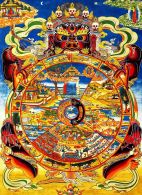Taiji&Benessere
Bibliografia > Rass.stampa
Per secoli il Tai chi chuan è stato praticato in Asia per migliorare il benessere e ridurre lo stress. Recentemente questa disciplina del corpo e della mente ha suscitato l'interesse dei ricercatori occidentali. Una ricognizione sulle ricerche sul Tai chi chuan, pubblicate in lingua inglese dal 1989 ad oggi, evidenzia studi clinici comprendenti soggetti anziani, pazienti con complicazioni cardio vascolari, pazienti con malattie croniche, e pazienti che potevano trarre benefici psicologici dalla pratica del Tai chi chuan. Solo gli studi con i soggetti anziani e con pazienti con problemi cardiaci consentono, per progetto e dimensione, di trarre conclusioni sull'efficacia del Tai chi chuan; mentre gli altri, coinvolgendo un numero limitato di soggetti, forniscono informazioni ancora limitate sui benefici del Tai chi chuan. Contemporaneamente si sta diffondendo la consapevolezza che i malati di cancro presentano una molteplicità di bisogni correlati al recupero fisico, ai rischi per il sistema cardio-vascolare, al disagio psicologico. Il Tai chi chuan può recare benefici a questi pazienti sotto il profilo psichico e fisico proprio grazie al suo duplice aspetto di meditazione ed esercizio fisico. Ecco una selezione dei suddetti articoli:
Impact of Tai Chi exercise on multiple fracture-related risk factors in post-menopausal osteopenic women: a pilot pragmatic, randomized trial
BMC Complementary and Alternative Medicine 2012, 12:7 doi:10.1186/1472-6882-12-7
Peter M Wayne (pwayne@partners.org)
Douglas P Kiel (Kiel@hsl.harvard.edu)
Julie E Buring (jburing@rics.bwh.harvard.edu)
Ellen M Connors (ECONNORS@PARTNERS.ORG)
Paolo Bonato (pbonato@partners.org)
Gloria Y Yeh (gyeh@bidmc.harvard.edu)
Calvin J Cohen (calcohenmd@aol.com)
Chiara Mancinelli (CMANCINELLI@PARTNERS.ORG)
Roger B Davis (rdavis@bidmc.harvard.edu)
ISSN 1472-6882
Article type Research article
Submission date 30 August 2011
Acceptance date 30 January 2012
Publication date 30 January 2012
Article URL http://www.biomedcentral.com/1472-6882/12/7
Tai Chi (TC) is a mind-body exercise that shows potential as an effective and safe intervention for preventing fall-related fractures in the elderly. Few randomized trials have simultaneously evaluated TC’s potential to reduce bone loss and improve fall-predictive balance parameters in osteopenic women.... .
© 2012 Wayne et al. ; licensee BioMed Central Ltd.
This is an open access article distributed under the terms of the Creative Commons Attribution License (http://creativecommons.org/licenses/by/2.0),
which permits unrestricted use, distribution, and reproduction in any medium, provided the original work is properly cited.
Tai Chi Chuan: Mind-Body Practice or Exercise Intervention? Studying the Benefit for Cancer Survivors Patrick Mansky, MD
National Center for Complementary and Alternative Medicine, National Institutes of Health, Department of Health and Human Services, Bethesda, Maryland, mailto:manskyp@mail.nih.gov
Tai chi chuan (TCC) has been used as a mind-body practice in Asian culture for centuries to improve wellness and reduce stress and has recently received attention by researchers as an exercise intervention. A review of the English literature on research in TCC published from 1989 to 2006 identified 20 prospective, randomized, controlled clinical trials... .
Integrative Cancer Therapies, Vol. 5, No. 3, 192-201 (2006)
DOI: 10.1177/1534735406291590
© 2006 SAGE Publications: http://ict.sagepub.com/cgi/content/abstract/5/3/192?ct
Full Text (PDF) sintesi
Tai chi for treating rheumatoid arthritis (Review)Han A, Judd M, Welch V, Wu T, Tugwell P, Wells GA
published in The Cochrane Library 2009, Issue 1
Tai Chi for Disease Activity and Flexibility in Patients with Ankylosing Spondylitis—A Controlled Clinical Trial
Eun-Nam Lee1, Young-Hee Kim1, Won Tae Chung2 and Myeong Soo Lee3
Advance Access Publication 13 July 2007
Randomized Controlled Trial of Tai Chi for Tension Headaches
Ryan B. Abbott1, Ka-Kit Hui1, Ron D. Hays2, Ming-Dong Li1 and Timothy Pan1
Advance Access Publication 12 August 2006
Effects of a Behavioral Intervention, Tai Chi Chih, on Varicella-Zoster Virus Specific Immunity and Health Functioning in Older Adults
Michael R. Irwin, MD, Jennifer L. Pike, PhD, Jason C. Cole, PhD and Michael N. Oxman,MD
Psychosomatic Medicine 65:824-830 (2003)
© 2003 American Psychosomatic Society
Intense Tai Chi Exercise Training and Fall Occurrences in Older, Transitionally Frail Adults: A Randomized, Controlled Trial
Steven L.Wolf, PhD, FAPTA,RichardW. Sattin, MD,w Michael Kutner, PhD, Michael O’Grady, MD,Arlene I. Greenspan, DrPH, and Robert J. Gregor, PhD
2003 by the American Geriatrics Society
Tai Chi -- an Innovative Approach to Reduce Falling in the Elderly
Published in Journal Watch Cardiology August 1, 1996


